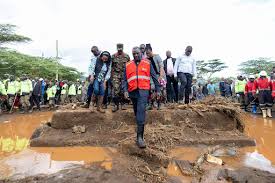

President William Ruto during a tour of Mai Mahiu /File.
Some Mai-Mahiu flood victims have accused the government of abandoning promises it made, following the devastating floods that killed 60 people.
Bernard Ndung’u, a survivor whose life was torn apart by the disaster, accused President William Ruto of making hollow promises.
“The President arrived just the second day after the disaster. Standing amid the ruins, he made three solemn promises,” Bernard recounts, his voice ladened with bitterness.
“He said all victims would be resettled, every property lost would be restored and experts would be sent to determine whether the land is still safe for us to live on. But all that was just empty words. Since then, nothing has happened”
On that fateful night, Ndung’u was awakened at around 2 am with a deafening sound and within minutes, the raging floodwaters swept away his home.
“I rescued nothing. The only thing I carried out of the floods were bodies of three boys,” he says.
Ndung'u is among the many survivors whose stories are featured in Greenpeace Africa’s groundbreaking documentary Surviving the Aftermath.
Unveiled last Friday at the Louis Leakey Auditorium at the National Museums of Kenya, the film captures not only the raw emotional pain and economic damages brought by climate disasters, but also draws a stark connection between these extreme weather events and the powerful fossil fuel industries responsible.
Last year, furious floods tore through the rocky valleys of Mai-Mahiu, causing massive destruction. The Old Kijabe River burst its banks with a terrifying force, sweeping away hundreds of people, livestock, and countless possessions.
The scene left behind was of
utter devastation: Vehicles lay like discarded toys, shattered
homes were reduced to rubble, trees were uprooted and faces were etched with grief and disbelief.
Ndung’u says he lost his children and means of survival in under twenty minutes.
Similarly heart-wrenching is the story of Jane Muthoni.
“Before dawn, I had lost my two children and my husband,” she says amid tears. “My two-year-old daughter was just about to celebrate her birthday.”
Rescued downstream, Jane survived, but the search for her daughter’s body ended
in heartbreak. “My husband’s body was found one week later, but my daughter has
never been found.”
John Kinuthia says he lost everything that night when the house was swept away.
Amos Wemanya, Greenpeace Africa’s responsive campaigns lead, condemned polluters who have for decades ravaged the planet while evading responsibility.
“It’s time for them to pay,” he says. Wemanya says some corporations have amassed vast profits while accelerating environmental destruction.
In July, the ICJ issued an advisory opinion. Read by Judge Iwasawa Yuji, it said states must protect the environment from greenhouse gas emissions with due diligence and international cooperation.
This includes upholding the Paris Agreement’s goal of limiting global warming to 1.5 degrees celsius above pre-industrial levels. The court warned that failure to meet these obligations results in legal accountability, requiring states to halt harmful activities, guarantee non-repetition and provide reparations where necessary.
The ruling drew on commitments made by member states through numerous environmental treaties—from the Kyoto Protocol to the Biodiversity Convention—emphasising that a clean, healthy and sustainable environment is fundamental to human rights.
Because states have ratified human
rights treaties, including the Universal Declaration of Human Rights, they are
bound to ensure those rights by tackling climate change head-on.
This legal momentum was sparked in part by the Pacific Island State of Vanuatu, which in September 2021 sought an advisory opinion from the court, inspired by youth activists from the Pacific Island Students Fighting Climate Change.
Their urgent call underscored the critical need for action, especially for vulnerable small island nations facing existential threats.













